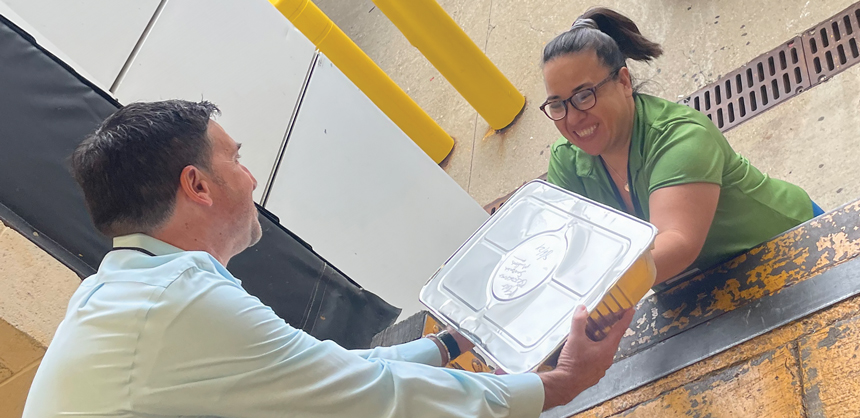Green MeetingsMarch 6, 2025
How Net Zero Practices Can Boost Attendance By Kathy MonteGreen Meetings
How Net Zero Practices Can Boost Attendance
Canada has become a global leader and changemaker when it comes to sustainability. Photo courtesy of Destination Canada
In today’s event landscape, sustainability isn’t just a buzzword — it’s a powerful draw for attendees who prioritize environmental responsibility. Integrating green and net zero initiatives into a convention strategy can enhance appeal and demonstrate a commitment to the planet.
Plus, many attendees no longer see sustainability as a nice option in the meetings industry. They now consider it as a must-have.
An average event generates approximately 389 pounds of CO2-equivalent emissions per day, according to Meet Green, a sustainable event management agency.
A three-day event with 1,000 people creates around 5,670 kilograms of waste, which is about equivalent to the weight of four compact cars. MeetGreen works with clients that want a sustainable in-person meeting but are not sure how to get started, helping them create checklists and implement the steps needed to attain their sustainability goals.
“Creating a baseline will help determine if your sustainability efforts are working,” says MeetGreen president Nancy Zavada. “After the event, you measure against the baseline to see what areas you are making a difference.”
Demographics are helping with sustainability. Millennials and Gen Z are more socially and environmentally conscious than previous generations. “Many are good stewards of the Earth and are quite concerned about sustainability, which is very positive,” Zavada says.
Sustainable event planning minimizes ecological footprint, elevates brand reputation, engages socially conscious attendees and aligns with the United Nations’ Sustainable Development Goals (SDGs) and other global initiatives. The strategies for creating impactful, eco-friendly events are vast and varied, with benefits that range from reducing waste to supporting local economies.
While the common misconception is that sustainability comes at a greater cost, a study by the Events Industry Council (EIC) has shown that sustainable practices can result in up to a 30% savings on event expenses.
“Sustainable solutions are now an expectation for events, even a requirement for some,” says Donna Collins, sustainability champion at Meetings & Incentives Worldwide (M&IW), which is accredited by PURPOSE Sustainable Event Strategy.
M&IW targets the five main sources of event emissions — travel, energy, suppliers, food and waste. “There are discussions at every step of the planning process to ensure the most sustainable solutions are considered and prioritized,” says Collins. “Attendees, especially younger generations, also care about sustainability at events, so I always encourage sharing a program’s sustainable practices. Whether it’s an FAQ on the event website, a dedicated page on the event mobile app or a session within the event agenda, communicating throughout the attendee journey creates a connection and encourages participation. When attendees understand the sustainable actions already being taken, they become empowered and look for ways to actively contribute. Ideally, it also inspires them to live more sustainably in their personal lives as well.”
Of course, there is no “right” way to handle sustainability. Collins adds: “While the industry as a whole still has a long way to go, a trusted supplier partner shared this quote that perfectly encapsulates M&IW’s approach: ‘We don’t need a handful of people doing zero waste perfectly. We need millions of people doing it imperfectly.’”
LEED-Certified Convention Centers
One way to attract attendees through sustainable practices is to choose venues that prioritize the environment. You can start planning a zero-waste event by selecting a venue that already practices sustainability or is open to collaborating on an event’s zero-waste objectives.
But when it’s time to choose a venue for your gathering, how do you know which ones take sustainability seriously? Some features of sustainable convention centers include rooftop farms, solar arrays, bee sanctuaries and gardens. One place to start is with convention centers that have achieved Leadership in Energy and Environmental Design (LEED) certification, reflecting their commitment to eco-friendly standards. LEED is a globally recognized designation for green buildings that have been designed to reduce or eliminate their carbon footprint and create environmental and social benefits.
LEED certification is governed by the U.S. Green Building Council, which uses a four-tiered system to rate how efficiently a structure addresses carbon emissions, energy and water usage, waste management, transportation, materials, health and indoor environmental quality. The maximum score is 110 points, and for a venue to achieve Platinum status, it must score 80 or higher. A score of 60-79 is Gold level and 50-59 is Silver, while 40-49 represents Certified status.
There are two platinum-certified convention centers in the U.S. — San Francisco’s Moscone Center (82 points) and the Seattle Convention Center (80 points).
Those facilities that have achieved a Gold rating include:
- Los Angeles Convention Center, Anaheim Convention Center and San Diego Convention Center (California)
- Walter E. Washington Convention Center (Washington, D.C.)
- Huntington Place (Detroit, MI)
- Ernest N. Morial Convention Center (New Orleans, LA)
- Orange County Convention Center (Orlando, FL)
- Colorado Convention Center (Denver, CO)
- Georgia World Conference Center (Atlanta, GA)
- George R. Brown Convention Center (Houston, TX)
- The Venetian Convention and Expo Center (Las Vegas, NV)
Destination Canada’s Event Sustainability Plan a Success
Another country with a robust sustainability plan is Canada. “Sustainability is more than a competitive advantage — it is a collaborative one, too. A long-term commitment from the entire business event supply chain is a must-have on the path to sustainability,” says Virginie De Visscher, executive director of business events for Destination Canada. That organization has partnered with Greenstep, a leading Canada-based environmental sustainability firm, to evaluate its own carbon footprint and propose a plan to reach net zero emissions.
Destination Canada also aims to be a changemaker accelerating progress toward the industry’s net zero targets for 2050. The group’s Business Events Sustainability Plan has been highly successful across the industry, establishing Canada as a global leader in sustainable business events. Launched in May 2022, it has achieved several notable milestones:
Global Recognition: The plan won the 2023 IMEX-EIC Innovation in Sustainability Award, highlighting its innovative approach and impact on the industry
Widespread Adoption: As of October 2023, 20 Canadian destinations are participating in the Global Destination Sustainability Index (GDS-Index), representing the highest national concentration globally
International Leadership: The plan has positioned Canadian destinations as changemakers, accelerating progress toward the industry’s 2050 net zero targets
Comprehensive Approach: The plan addresses economic, social and environmental sustainability practices, providing coaching, training and education opportunities to domestic partners
Measurable Impact: The plan includes a national destination assessment study to evaluate existing initiatives and track changes over time, ensuring accountability and continuous improvement
Industry Collaboration: Destination Canada has established a Canadian task force of sustainability experts and also engaged in discussions with international organizations to drive sustainability in tourism and business events
Innovative Programs: Several Canadian cities have launched their own sustainability initiatives aligned with the plan, such as Edmonton’s Responsible Events Program. Destination Canada also launched its Sustainability Storybook as a comprehensive resource to showcase sustainable initiatives and practical solutions for business events across Canada

Sustainable event planning can minimize carbon footprint, elevate your brand reputation and engage eco-conscious attendees. Destination Canada
Making the Right Kind of Impact
As an association planner you want to help ensure that your meetings have less of an impact on the environment, and a good place to start is the Events Industry Council’s (EIC) Sustainable Event Professional Certificate Program, which provides the knowledge and tools needed to design and implement your own sustainable events.
The certification covers 16 modules that include guidance on understanding the business value of sustainability, improving the environmental performance of meetings and events and effective methods for achieving social impact goals.
Emissions Offsets
One way to bring sustainability to your gatherings is by offsetting your emissions. This is done by calculating the carbon footprint of your event and then investing in offset projects to achieve net zero emissions. The Net Zero Carbon Events initiative unites stakeholders across the business-events industry, providing a framework for organizers to follow to help achieve net-zero emissions by 2050.
It’s also important to make sure your food and beverage offerings are sustainable. Work with caterers who prioritize locally sourced, organic ingredients to reduce transportation emissions and support local agriculture. Reducing food waste and offering plant-based options can also significantly lower the environmental impact of event catering.
Food waste is one of the largest sources of event-related waste. Make sure your agreement with the venue includes separating edible food from waste. Quality leftovers can be donated to local charities or food rescue organizations, turning potential waste into a community benefit. And anything inedible can be composted or sent out to be transformed into fertilizer.
Transportation is a big part of sustainability as well. Encourage attendees to use public transportation, carpooling or other eco-friendly travel options. Providing incentives such as discounted transit passes or organizing shuttle services can facilitate greener travel choices.
To be truly sustainable, all stakeholders must be engaged. Involve attendees by encouraging them to participate in sustainability initiatives, such as using event apps instead of printed materials, or participating in onsite recycling programs. Educating attendees about the event’s green efforts can foster a sense of shared responsibility and enhance their overall experience.
One of the best ways to start planning a zero-waste event is by selecting a venue that already practices sustainability or is open to collaborating on an event’s zero-waste objectives.
By embedding these sustainable practices into your event planning, you not only reduce environmental impact but also resonate with attendees who are environmentally conscious. This commitment to sustainability can set your convention apart, attracting a conscientious audience and setting a standard for future events. | AC&F |








